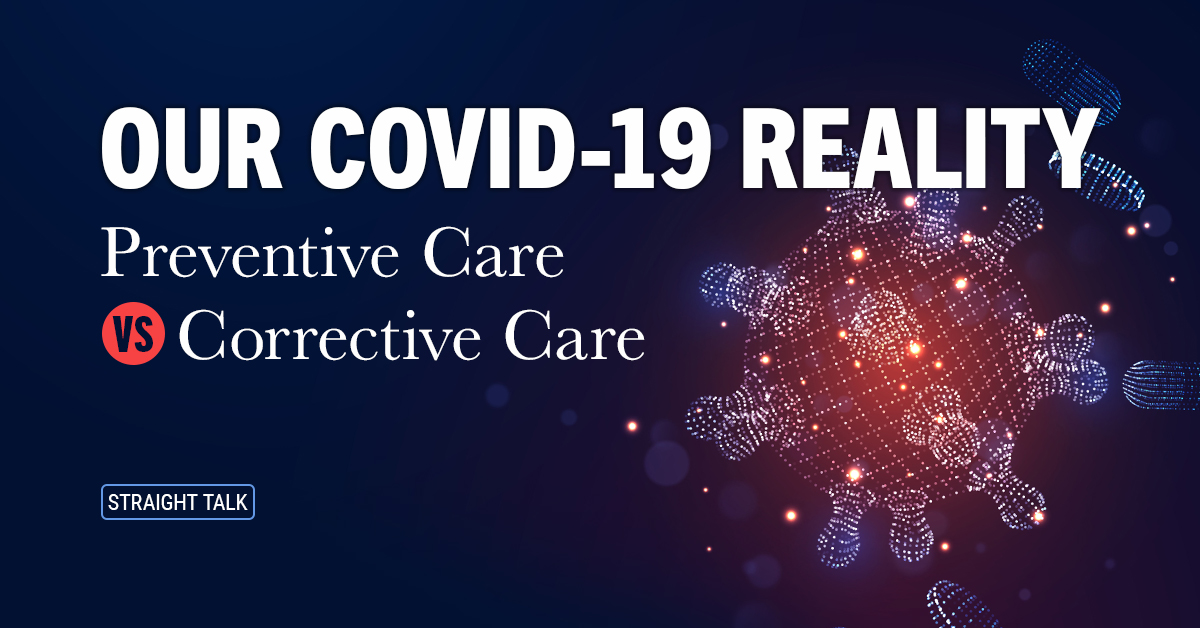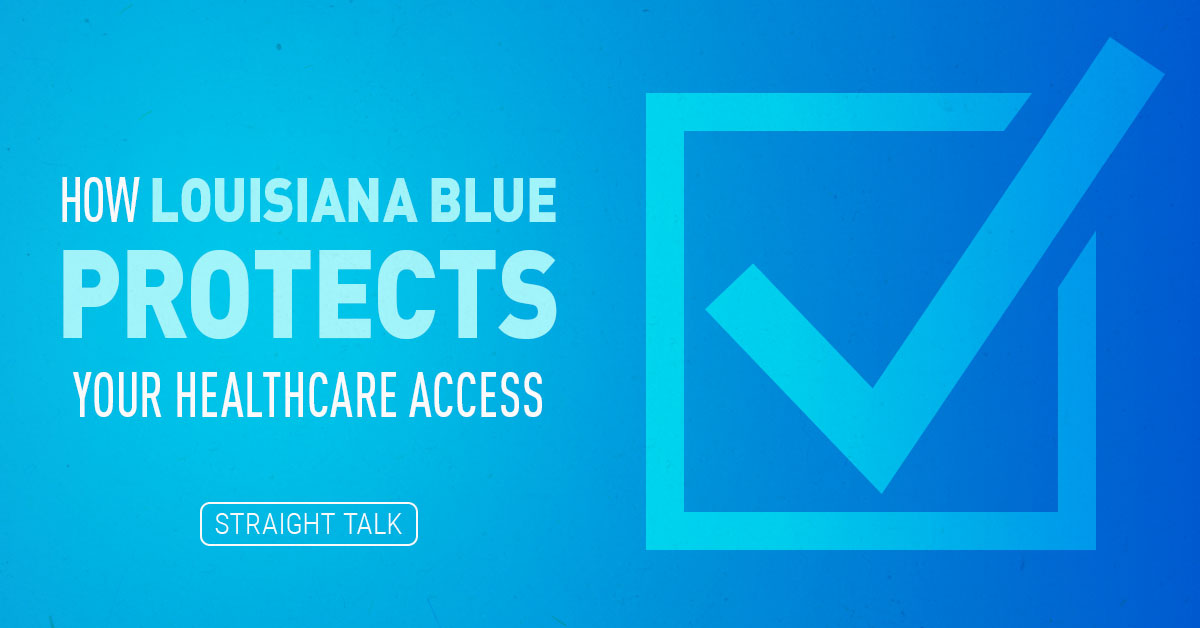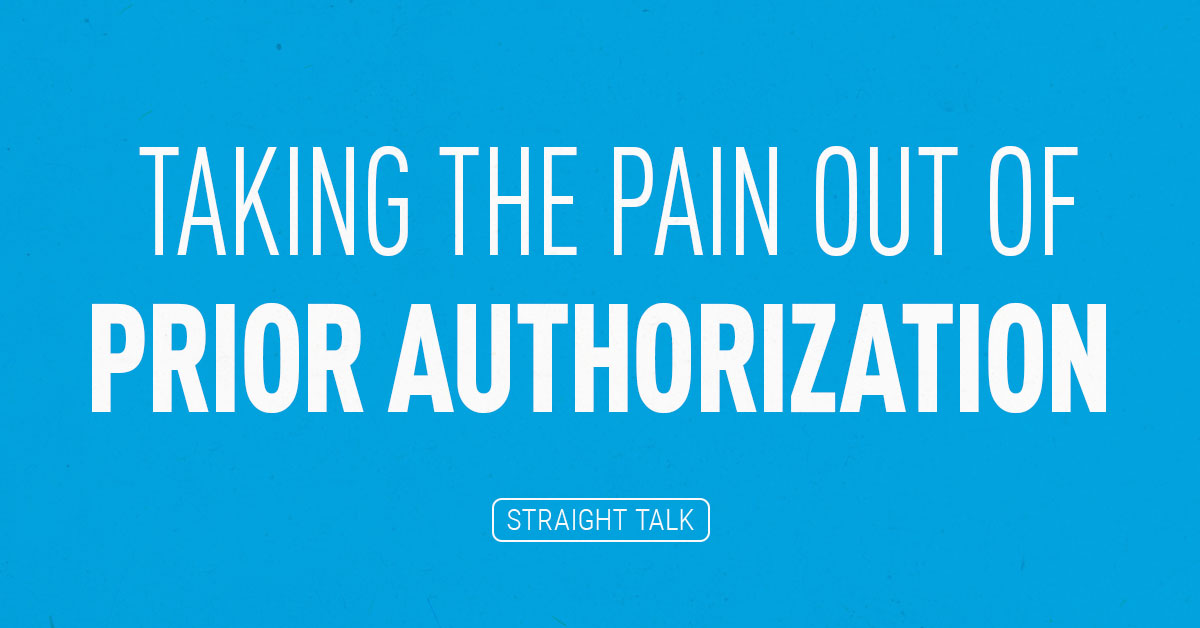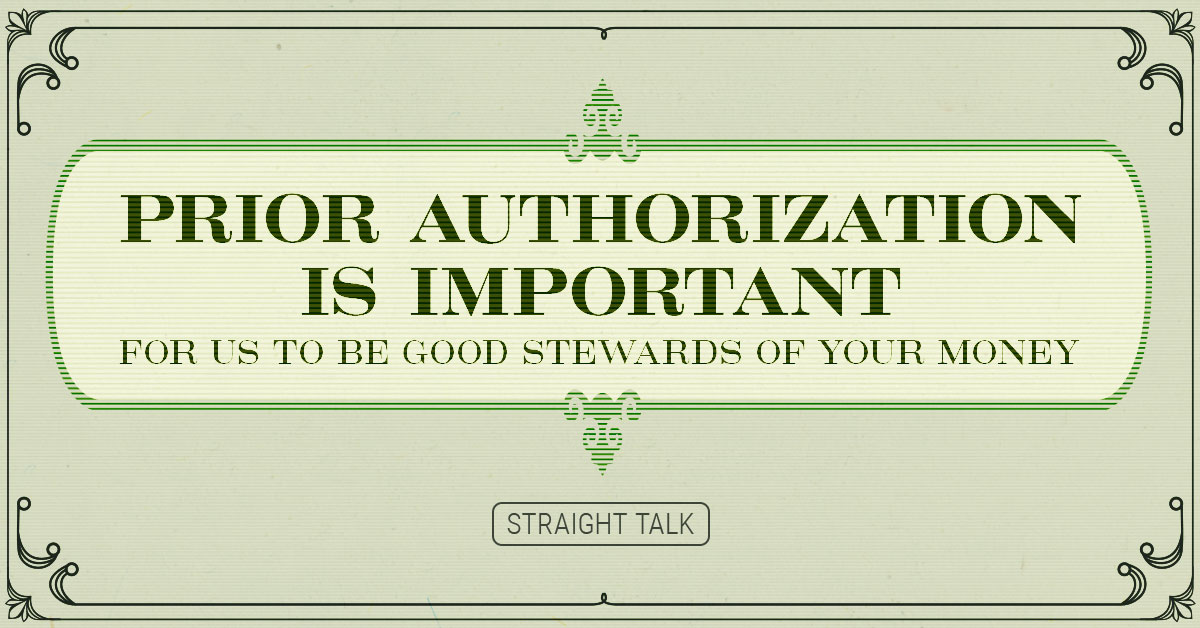In the world I work in, there are two basic types of health care. One is CORRECTIVE care, where something has already gone wrong and you are trying to fix it. Think about someone who has had a stroke, or heart attack, and all the surgery, medicines and therapies we would use to help them be well again. Corrective care is often messy, expensive and dangerous, and you always want to avoid it if you can. So, what can we do to minimize corrective care?
Turns out we can do something. We can focus on PREVENTIVE care, where something appears it might go wrong, or we get some sign or symptom that points us to some potential future bad outcome and we intervene now, before something goes wrong. Preventive care is almost always safer, cheaper and much less invasive than corrective care.
Perhaps a person has high blood pressure or high cholesterol; those conditions don’t cause problems you would feel immediately, but if they are left untreated you could have a heart attack or stroke and be in the CORRECTIVE zone. To avoid that, health care providers, health insurers and others who are part of your care intervene now with medicine, education and lifestyle changes. And, that PREVENTIVE care might prevent that CORRECTIVE care down the road.
Preventive Care > Corrective Care
Almost always, preventive care is much less invasive, expensive or as dangerous as corrective care might be. The more preventive care we can use, the less corrective care we have to use.
In fact, no one in their right mind would ever choose CORRECTIVE care over PREVENTIVE if they could help it. Once you’re in corrective care, you really wish you weren’t!
Did you know that one of the earliest types of preventive care ever used in the United States was, basically, vaccination, although the term didn’t exist then? In 1777, George Washington, then commander-in-chief of the Continental Army, ordered mandatory inoculation for troops if they had not survived a smallpox infection earlier in life! They didn’t have the safe, effective vaccines that we have now; they just tried to give people mild cases of whatever disease they were trying to prevent. It didn’t work as well as today’s vaccines, but it was a start.
Luckily, today we have vaccines so we can get immunity via a quick jab rather than giving someone a mild case of what we are trying to prevent – and all the potential side effects that come with being sick.
Today’s vaccines are globally tested, safe and very effective. Being vaccinated against diseases like polio, tuberculosis or COVID-19 are prime examples of PREVENTIVE care. Avoiding those vaccines and allowing those diseases to flourish will lead to huge amounts of CORRECTIVE care. That’s the most expensive, most dangerous and most invasive type of care. CORRECTIVE.
Vaccines = Preventive Care
So far in Louisiana, in less than two years, nearly 15,000 people caught COVID-19 cases so severe that even the strongest corrective action couldn’t save them. They died of COVID-19. And it turns out that vaccination (preventive care) against COVID-19 greatly reduces the need for hospitalizations (corrective care). In fact, I’m struggling to understand why anyone, with the knowledge we have in Louisiana today, would pass on getting vaccinated. Even after a solid year of listening to people talk about avoiding vaccination, I’ve yet to hear a single reason to not get the vaccine that can hold up under the bright glare of truth and science. Not one.
If you are still avoiding the preventive care of COVID-19 vaccines/boosters, ask yourself these questions:
Am I unvaccinated because I believe these current vaccines are unsafe?
The U.S. Food and Drug Administration (FDA) has given full approval to one of the most popular COVID-19 vaccines – the one made by Pfizer – for people 16 years and older. Two others (Moderna and Johnson & Johnson) have emergency use authorizations for adults, and Pfizer has emergency use authorization for 5 – 15-year-olds. The FDA has authorized boosters for adults for all three vaccine types. And the U.S. Centers for Disease Control & Prevention (CDC) recommends everyone age 5 and older gets the COVID-19 vaccine and everyone age 18 and older gets a booster because medical evidence from the past year clearly shows vaccination is the safest, most effective way to prevent getting severely ill, being hospitalized or dying from COVID-19. Millions of people in Louisiana have received these vaccines and boosters, including thousands of younger folks. And no one has died of vaccination. No one.
Am I unvaccinated because I believe someone is trying to control my behavior and make me do something I don’t want to do, or put a chip in my body?
This argument has never made sense to me. There is zero evidence that the vaccines are a conduit for putting “chips” in anyone’s bodies. It’s the stuff of sci-fi books and movies. However, if you own a smartphone, there’s a good chance anyone who wants to already has a way to track your movements and online activities. And, data from your phone is being shared with any apps you use and with companies that use it to market goods and services to you. Think about it – it’s no coincidence when you see a post in your social media feed or receive an email about a certain product, store or restaurant shortly after you search for a similar product online, or drive into a new city or state. If you are really concerned about unseen people knowing what you’re doing, then you should toss your smartphone instead of worrying about a chip being in the vaccine. And really – are your movements, your personal to-ing, and fro-ing, so valuable that the government would want to know what you’ve been up to? Is that a rational response?
Am I unvaccinated because I believe the shots will damage my fertility or harm my unborn child?
We now have solid evidence that catching COVID-19 DURING PREGNANCY increases your risk for pre-term birth. That’s why CDC especially recommends COVID-19 vaccines for people who are pregnant, breastfeeding or planning to become pregnant in the near future. In fact, expectant moms risk MORE fetal complications and early births by not getting vaccinated. And the fertility argument has been discredited many times over. There is no link between any fertility problems and the COVID-19 vaccines.
Am I unvaccinated because I don’t believe COVID-19 is a genuine threat?
14,800 Louisiana lives have been snuffed out before their time because of COVID-19. So many people that our life expectancy has gone DOWN by 1.5 years amid the pandemic. You cannot predict what COVID-19 will do to you or your children if you catch it.
Am I unvaccinated because I can’t afford it?
COVID-19 vaccines and boosters are covered for free on your health plan, Medicare and/or Medicaid under requirements of the CARES Act, which includes provisions for the uninsured to get their shots for free, too. You can even get free rides to and from your appointment, if you don’t have a car, can’t drive or have transportation issues. Call 211 to book your ride. In New Orleans, you can hop on a Blue Bike for a free, 30-minute trip to and from your COVID-19 vaccine or booster appointments with the codes SleevesUpNola1 and SleevesUpNola2.
Not only that, the State of Louisiana has extended its Shot for 100 program through the end of the year. So if you get your first COVID-19 vaccine at a participating location by Dec. 31, you can earn $100. See their site for details.
Am I unvaccinated because I don’t know where to go?
Almost every drugstore in the state, including the ones in big-box retailers, is taking appointments right now. You can call on the phone, use their websites or drop by. And the shots are free. The state has a full list you can search. Or call the State of Louisiana’s Vaccine Hotline at 1-855-453-0774 for help scheduling an appointment.
Am I unvaccinated because I already had COVID-19?
Research shows clearly that the natural immunity in those cases wanes relatively quickly and will not protect you against newer variants of the disease like Omicron or Delta. Even if you’ve had COVID-19, health officials say you still need the vaccine and booster because those combined with your natural immunity give you the strongest possible protection. That’s why we don’t use the 1700s method of inoculation I mentioned earlier – vaccines are much more effective and less risky than getting sick.
Am I unvaccinated because my doctor told me not to take the shots?
Get a second opinion; even doctors sometimes fall prey to misinformation. But 96% of physicians in the U.S. are ALREADY vaccinated, and 88% of all nurses are vaccinated.
Am I unvaccinated because I’m taking ivermectin or hydroxychloroquine?
There is NO REPEATABLE, PEER-REVIEWED RESEARCH (that means real, valid, scientifically based research that you can trust and count upon) that shows either of these drugs help you resist COVID-19 or will help you recover faster if you catch COVID-19. Does not exist. For a medicine to be safe and effective, you should always look for REPEATABLE, PEER-REVIEWED research that says it is safe and effective FOR THE CONDITION YOU CARE ABOUT. Ivermectin works great on intestinal parasites, but COVID-19 is a VIRUS. Very different stuff.
Final Word
The vaccines are critical to saving Louisiana lives, especially in the wintertime.
But don’t take my word for it, listen to Dr. Jeremy Wigginton, one of our Blue Cross medical directors:
“Now is the time to sleeve up and get your COVID-19 vaccine or booster shot. The vaccines are safe and effective at preventing death, hospitalization and severe illness. And the booster shot enhances protection from your original vaccine so your immune system stays ready to recognize and fight off the virus… Many people are planning to gather with family and friends during the holidays. Having everyone who is eligible get the vaccine or booster makes that as safe as possible. That’s especially important if you are going to be around children younger than 5 or others who can’t get the vaccine.”
Straight Talk is, you can engage in PREVENTIVE care now and get vaccinated, or you greatly increase the odds of you, or your loved ones, needing expensive, messy, CORRECTIVE care later. Vaccination is real, safe, effective and free. Period.





Leave a Reply